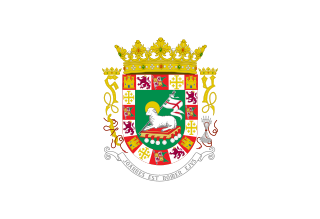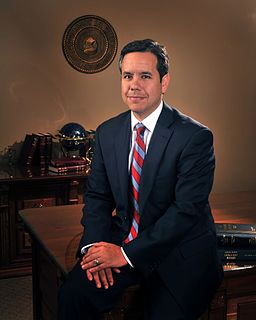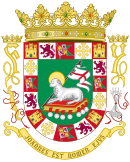
The government of Puerto Rico is a republican form of government with separation of powers, subject to the jurisdiction and sovereignty of the United States. Article I of the Constitution of Puerto Rico defines the government and its political power and authority pursuant to U.S. Pub.L. 82–447. Said law mandated the establishment of a local constitution due to Puerto Rico's political status as a commonwealth of the United States. Ultimately, the powers of the government of Puerto Rico are all delegated by Congress and lack full protection under the U.S. Constitution. Because of this, the head of state of Puerto Rico is the President of the United States.

The Governor of Puerto Rico is the executive of the U.S. Commonwealth of Puerto Rico as its head of state and head of government and, by its nature, constitutes the executive branch of the government of the island. The governor is also the commander-in-chief the Puerto Rico National Guard.

Luis Guillermo Fortuño Burset is a Puerto Rican politician who served as governor of Puerto Rico, a territory of the United States of America, and as president of the New Progressive Party of Puerto Rico (PNP) until 2013, served as president of the Council of State Governments during 2012 and served as president of the Southern Governors Association from 2011 to 2012. On 26 June 2011 he announced his plans to run for reelection. He was defeated in the 2012 elections by Alejandro Garcia Padilla.

David Enrique "Quique" Bernier Rivera is a Puerto Rican dentist and politician that has served in various roles in public service in Puerto Rico. Bernier first served as executive director of the Office of Youth Affairs of Puerto Rico and was later confirmed as the youngest Secretary of Sports and Recreation of Puerto Rico in history. Four years later, he was unanimously confirmed as Secretary of State of Puerto Rico for the administration of Alejandro García Padilla. He was the 2016 candidate for Governor of Puerto Rico of the Popular Democratic Party.

Pedro Pierluisi Urrutia is a Puerto Rican attorney, lobbyist, and politician who served as de facto governor of Puerto Rico from August 2 to August 7, 2019, when the territory's Supreme Court ruled his assumption of office was unconstitutional.
Law enforcement in Puerto Rico is one of three major components of the criminal justice system of Puerto Rico, along with courts and corrections. Although there exists an inherent interrelatedness between the different groups that make up the criminal justice system based on their crime deterrence purpose, each component operates independently from one another. However, the judiciary is vested with the power to make legal determinations regarding the conduct of the other two components.

The Puerto Rico Department of Education (PRDOE) is one of only two statewide public education system in the United States. The PRDOE is the state education agency responsible of managing state-operated schools in Puerto Rico as well as its education system and curricula. The department, headquartered in the Hato Rey area of San Juan, is the result of a United States state department of education. It is also the largest agency of the executive branch of Puerto Rico, with, as of 2013, an annual budget of more than $3.5 billion USD and over 72,000 staff—including more than 41,000 teachers, and as of 2020 the department is the third-largest school district in the United States by enrollment, with over 473,000 students and over 1,500 schools.

Puerto Rican citizenship is the status of having citizenship of Puerto Rico as a concept distinct from having citizenship of the United States. Such a citizenship was first legislated in Article 7 of the Foraker Act of 1900 and later recognized in the Constitution of Puerto Rico. Puerto Rican citizenship existed before the U.S. takeover of the islands of Puerto Rico and continued afterwards. Its affirmative standing was also recognized before and after the creation of the Commonwealth of Puerto Rico in 1952. Puerto Rican citizenship was recognized by the United States Congress in the early twentieth century and continues unchanged after the creation of the Commonwealth of Puerto Rico. The United States government also continues to recognize a Puerto Rican nationality. It may also grant Spanish citizenship to Puerto Ricans on the basis of their Puerto Rican citizenship.

The Secretary of State of Puerto Rico leads all efforts that promote the cultural, political, and economical relations between Puerto Rico and foreign countries, and other jurisdictions of the United States. The post was created by Article IV of the Constitution of Puerto Rico which merely establishes that the secretary serves as acting governor when the governor is unable to perform his duties—a post similar to that of a lieutenant governor in U.S. politics. In recent times, however, the post has evolved into one similar to that of a foreign minister. Today, the secretary is the officer in charge of Puerto Rico's foreign relations, albeit under the consent of Congress or the U.S. Department of State due to Puerto Rico's political status.

Miguel Alberto Romero Lugo is a Puerto Rican lawyer and politician, and the former Secretary of Labor and Human Resources of Puerto Rico and Chief of Staff of Puerto Rico.

The Puerto Rico Department of Consumer Affairs (PRDCA) or — is the executive department of the government of Puerto Rico responsible of defending and protecting consumers in the U.S. Commonwealth. The Department is headed by a Cabinet-level Secretary, appointed by the Governor and subject to the advice and consent of the Senate.

The Puerto Rico Army National Guard (PRARNG) — officially designated in Spanish as Guardia Nacional Terrestre de Puerto Rico, but colloquially known as Ejército de la Guardia Nacional de Puerto Rico — is the Army National Guard of Puerto Rico which, together with the Puerto Rico Air National Guard, comprises the Puerto Rico National Guard. PRARNG is the ground-component of the Puerto Rico National Guard under control of the governor of Puerto Rico, currently Wanda Vázquez, that performs missions equivalent to those of the Army National Guards of the different states of the United States, including ground defense, disaster relief, and control of civil unrest.

The executive branch of the government of Puerto Rico is responsible for executing the laws of Puerto Rico, as well as causing them to be executed. Article IV of the Constitution of Puerto Rico vests the executive power on the Governor—whom by its nature forms the executive branch.
The Cabinet of Puerto Rico is the cabinet of the government of Puerto Rico and is composed of the most senior appointed officers of the executive branch of the government of Puerto Rico, who are generally the heads of the executive departments —known as the Council of Secretaries— and other officers at the same bureaucratic level—known as the Cabinet-level officers.
The Council of Secretaries of Puerto Rico is the group composed by the heads of the executive departments of the government of Puerto Rico. The Council is charged with leading the different sectors of public administration within the government and does not constitute an agency by itself.
The Office of the Chief of Staff of the Governor of Puerto Rico is the umbrella organization and government agency of the executive branch of the government of Puerto Rico that manages and oversees all the executive departments of the government of Puerto Rico and almost all executive agencies. The Office is headed by the Puerto Rico Chief of Staff and is composed by the Governor's Advisory Board and all other staff appointed by the Chief of Staff. The Office of the Chief of Staff is ascribed to the Office of the Governor.
The foreign and intergovernmental relations of Puerto Rico are governed by the Commerce and Territorial Clause of the Constitution of the United States. Because of this, they are subject to the plenary powers of Congress. Nonetheless, Puerto Rico has established relations with foreign nations, particularly with Hispanic American countries such as Colombia and Panamá. The establishment of such relations, however, requires permission from the U.S. Department of State or Congress itself. Still, most relations are already set by existent laws or trade agreements established beforehand by the United States that supersede the relation pursued by Puerto Rico.
Víctor A. Suárez Meléndez is a Puerto Rican lawyer and politician who was the 24th Secretary of State of Puerto Rico, as well as being the current executive director of the Puerto Rico Convention Center District Authority. Prior to his current position, Suárez served in various roles in public service, including as executive director of the Puerto Rico Ports Authority, as Secretary of Consumer Affairs, as deputy mayor of Carolina, and as Puerto Rico Chief of Staff. Before he joined the government, Suárez worked as an operations manager for Colgate-Palmolive and as a private-practice lawyer. He also worked as a consultant for various public and private entities in matters such as process reengineering, projects management, organizational restructuring and development of efficiency indicators.

Telegramgate, also known as Chatgate, or RickyLeaks was a political scandal involving Ricardo Rosselló, then Governor of Puerto Rico, which began on July 8, 2019, with the leak of hundreds of pages of a group chat on the messaging application Telegram between Rosselló and members of his staff from his term. The messages were considered vulgar, racist, and homophobic toward several individuals and groups, and discussed how they would use the media to target potential political opponents. The leak came in the midst of allegations by former Secretary of Treasury of Puerto Rico, Raúl Maldonado Gautier, that his department boasted an "institutional mafia" that Rosselló was involved in. The leaks also came a year after a previous scandal, dubbed WhatsApp Gate, involving other members of Rosselló's cabinet.












